by Nathaniel R
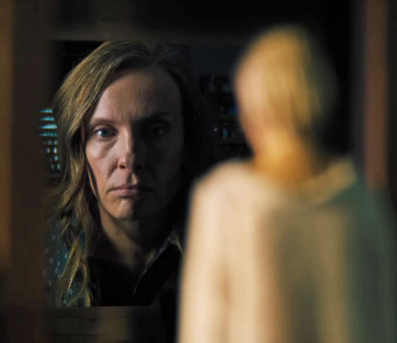 Toni Collette gives one of the year's great performances staring into the abyss of her own life in "Hereditary"Toni Collette doesn't like horror movies. We relate but there are exceptions: horror films starring Toni Collette are events. Her resistance to the genre, she refers to both of her biggest horror hits as "classic dramas", may be the strange key to why she's so superb in them, grounding them in emotional truths while simultaneously having the kind of stylistic range as an actor that can lift right off with them into otherworldly places.
Toni Collette gives one of the year's great performances staring into the abyss of her own life in "Hereditary"Toni Collette doesn't like horror movies. We relate but there are exceptions: horror films starring Toni Collette are events. Her resistance to the genre, she refers to both of her biggest horror hits as "classic dramas", may be the strange key to why she's so superb in them, grounding them in emotional truths while simultaneously having the kind of stylistic range as an actor that can lift right off with them into otherworldly places.
We recently sat down after an encore screening and lively Q&A of Hereditary. Her sole Oscar nomination came early in her career as the grieving mother of little Haley Joel Osment in The Sixth Sense (1999) and in a way, twenty years later, she's bookended that great early success with another very different grieving mother. This one's much harder to love but the performance is even better. Even if you don't love horror movies, it's impossible to miss the fact that her Annie, a self-indulgent artist and resentful mother, is a tour de force performance from an actress at the top of her game. Annie's life is traumas stacking up on traumas but Toni's performance keeps stacking brilliance upon brilliance.
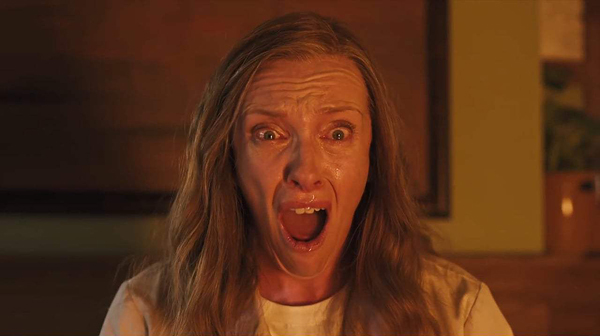
Though she's played her share of narcissists or flighty women, the actress herself comes across as generous and grounded, thrilled by the collaboration of filmmaking. She rolls her eyes about herself and other actors if anyone gets too precious or self-involved about the craft. Though she loves acting dearly, she hilariously refers to it as her "day job" as we're making small talk before the interview.
In a rare turnabout, as we sat down, Toni asked the first question. So we'll begin right there....
__________________
TONI COLLETTE: Are you a horror fan? I'm not.
NATHANIEL R: No. But I'm an acting junkie so as long as there's meat to the performances, I'll watch anything.
TONI COLLETTE: As long as there's complexity and a real narrative and emotion and something that reflects real life, that's my life raft. I found Hereditary so moving and profound that the horror is almost incidental.
It's so cool that you love it. A lot of actors say they don't watch their own films.
Oh no, I watch my own films! I like to see, not only what I was working towards and whether it worked, but when you work on a movie, it's such a beautiful shared collaborative experience that I really like to see if everyone's efforts paid off. I can't imagine not watching them.
Well, some people say they're in it for "the process". And speaking of... you rolled your eyes when someone mentioned 'the Method' earlier today.
Doesn't that just mean you align yourself with the character and try to make it as truthful as possible? That's just acting. Why is it called method? The method idea is like someone torturing themselves and everyone else around, them, really!
Like staying in character the whole shoot?
I don't have time for that. It's impossible. And it creates a huge imbalance and then everyone has to kind of fold to your demands and your energy and your needs, you know? And filmmaking is truly best when it is seriously collaborative. I just think that's too indulgent.
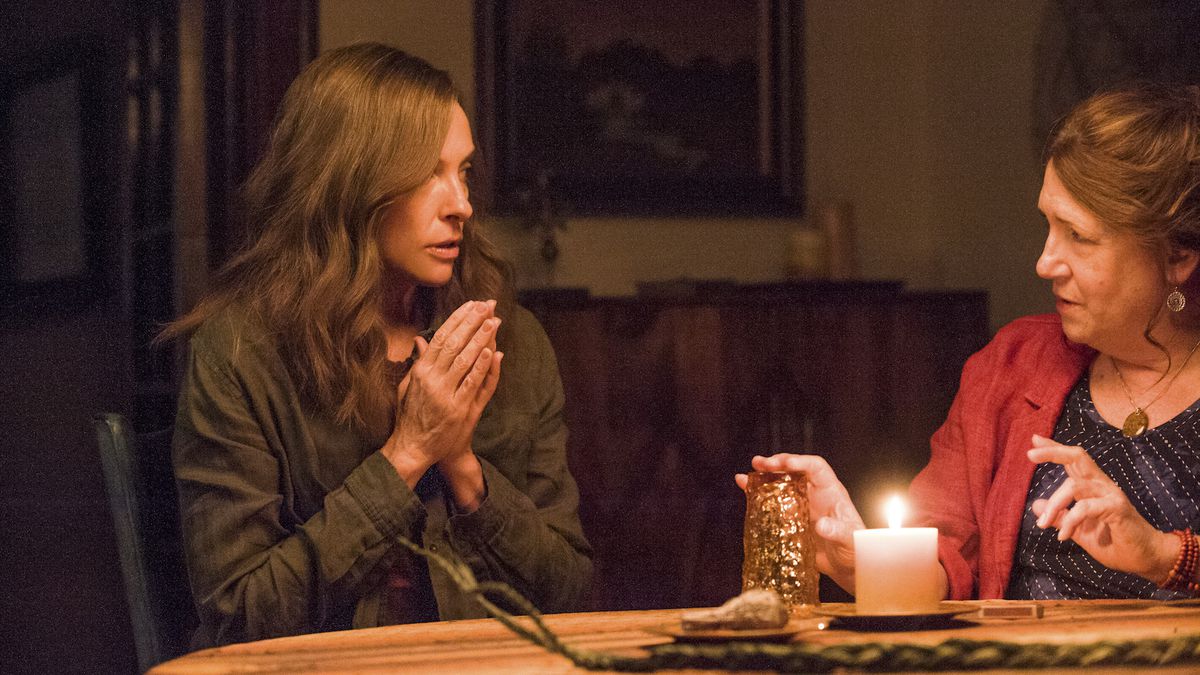 with Ann Dowd in Hereditary
with Ann Dowd in Hereditary
I want to talk about gestures. In your work you have a real command of your physicality. I'm thinking of Japanese Story, the way you'd touch your co-star or some very stylized almost operatic moments in Hereditary like that scene where you throw your hands up to your mouth.
Yes, it's like she's trying catch the words but they've already come out.
Are movements something that you plan -- 'I'm going to try that on set' or is it spontaneous?
It's a mixture of both. There's a certain amount of rumination and planning but ultimately I like to let it all go. The best work comes when you're not in control. If you're steeped enough in it, you can feel safe enough to allow that to happen.
More than anything I'm an instinctive actor. The thing is when I read a script that I get on a deep level it's almost like, as I'm reading it, I can hear it, I can see it, I already know what I'm going to do. I used to think that was lazy. 'Why don't I choose work that I don't get?' But what's the point of that if it's not speaking to me?
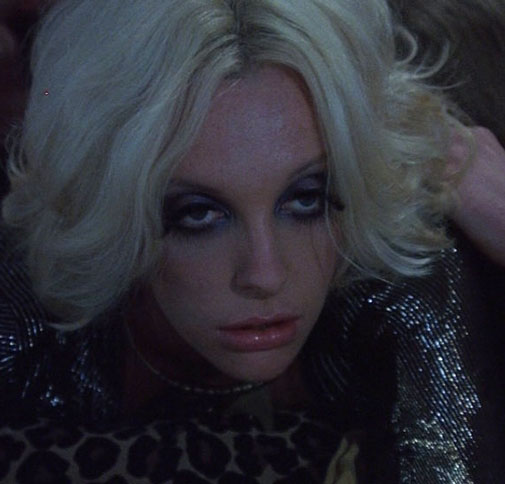 One of Toni's best performances, "Mandy Slade" in Velvet Goldmine (1998)Not that this role isn't challenging! This is my favorite performance of yours since Velvet Goldmine.
One of Toni's best performances, "Mandy Slade" in Velvet Goldmine (1998)Not that this role isn't challenging! This is my favorite performance of yours since Velvet Goldmine.
[Wistfully] Ohhhh, I love Velvet Goldmine.
The material is already great in both cases but you're elevating it even further.
Wow, that's very nice of you.
Both of those particular performances I'd describe as prismatic. You can read them in a lot of different ways on rewatches.
I love ambiguity because life is like that. Very rarely does anyone have a completely crystallized understandable moment. We're all so much more complicated than we let on.
Yes, but how do you act that? Are you just purposefully throwing in contradictions?
Sometimes. But if you think about what the character is aware of and what they're hiding or repressing. There are so many decisions to make and so many ways to look at it. I don't always sit around thinking 'hmmm, how will I...?' More often than not, it's just really kind of playing the script. It was so weird today when Ari [Hereditary's Writer/Director] said that what he wrote and what I did were so different, because what he wrote is exactly what I thought I was doing!
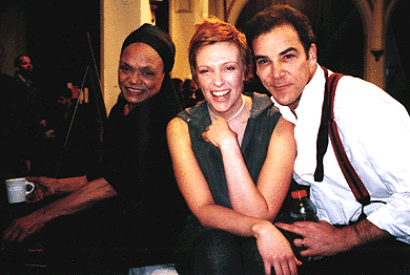 With Eartha Kitt and Mandy Patinkin on the set of the Broadway musical "Wild Party" in 2000
With Eartha Kitt and Mandy Patinkin on the set of the Broadway musical "Wild Party" in 2000
Do you think of yourself as a stylized actor? I ask because you're so good in these heightened genres like horror and musicals -- I was obsessed with your work in The Wild Party on Broadway.
That was so long ago! I'm definitely open to do another musical. I miss singing.
I just try to make it feel real, whether the character is big or small. Some people really are big and larger than life. Some people don't give anything away. It really depends on the character and the piece. I believe that the messier the character is the more exciting it is.
I don't know how to ask this delicately. There were a couple years after United States of Tara where it was like 'what is going on with Toni Collette's career?'. I'd see you in these itty bitty parts that gave you nothing to do and it was frustrating. How does it feel from the inside? Do you feel the ebbs and flows of a 'career'?
I can't see it on the whole. It's all swings and roundabouts. I've only ever taken a couple of jobs because it's a job, it's money. I do believe in 99% of the work I do but I've changed my attitude. I used to love a piece so much that I would play a tiny part just because I believed in it on the whole but ultimately that's doing myself a disservice. It becomes frustrating because I like to chew on it and get into it and those roles don't give you the opportunity.
But now we have Hereditary and you're really digging in again.
I do feel like that, too. When I say [about taking Hereditary] that 'I had not choice' it's partly that but also that the material was doing something that I had no control over.
And you followed that up with the series Wanderlust which is also amazing.
Last year was incredible, actually. They are two of the most well written projects I've ever worked on.
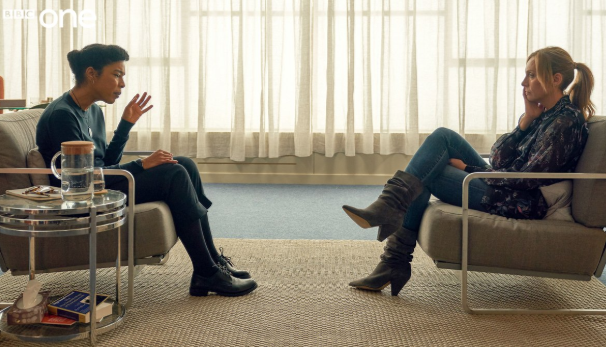
Wanderlust has a very high-wire episode that's just a therapy session with your character and your therapist played by Sophie Okonedo. I still don't know how you two pulled it off.
I mean, the writing is incredible. It's always a combination of the writing and how you interpret it. It would have been very different without Sophie. I'm so lucky it was Sophie because we knew each other. We stayed in the same hotel so we'd sit in our pjs running lines. Having that relationship really helped the onscreen relationship.
It's tremendously challenging material.
I look for opportunities where I can really go for it. That's the easiest way to put it. I don't want an easy day at the office. I like to be challenged. That's when it's satisfying.
Do you ever have moments where you're like 'I have no idea what to do with this?'
I always find something. [Laughs]
I don't know how you did what you did in Hereditary. That dinner sequence alone. It's so funny but also very upsetting.
You're not alone in that. It's a horror film but everyone finds that scene the most horrific part. It's somehow familiar. Within families, you exist together but you don't, like, share everything. There's a lot of repression. This woman is so overcome by that and has had enough. In a way it really is about an awakening it's just that it's too late which is, I think, the saddest part of the whole story.
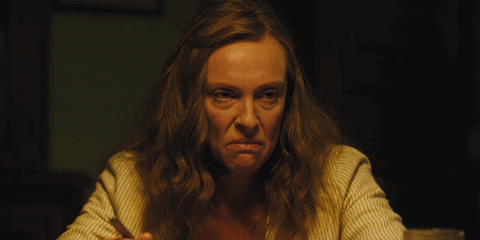
You see in that scene that she's kind of a child herself. Is that something you consciously thought about the character?
Oh, absolutely! Kids need guidance and love and to be nurtured. Annie, this poor woman, had a mother who completely betrayed her. She used her and manipulated her and she has not had a life of her own. She's so consumed by her own pain that she can't see straight. She can't take care of anyone else emotionally and she is someone who has constantly done that. I don't think she would have married Steve. I don't think she would have had kids. But her mother has literally orchestrated her entire life. All of this rage is so thick and fiery and, poor Peter, it just comes out of at him.
It was fascinating to hear that Alex Wolff and you had diametrically opposed acting processes because your relationship in the movie is really what elevates it.
He's incredible in the movie.
Random question but do you enjoy voicework for animated films? Boxtrolls and Mary & Max are such fun entries on your filmography.
Animation is so painstraking and laborious and the actors just come in for a fraction of that. It's so much fun because you have all the freedom and no responsibility. When you're just working with your voice it's an opportunity to create a reality with just one of your, oh I'm going to sound like an idiot, "instruments" [Laughter].
Sometimes if I'm working on a live-action film, and I'm unsure of something and I want to improve --some actors go to the monitor, I actually go to sound and listen back. There's so much truth in the voice and you can hear if you're honest or not.
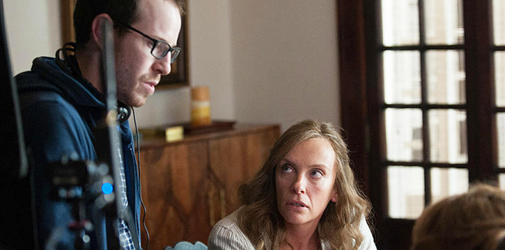 on the set with first-time director Ari Aster
on the set with first-time director Ari Aster
Let's talk awards and Oscars! You've been nominated before but people say it's become much more of a circus since then.
There is a lot of campaigning which makes one feel very dirty even sitting and answering these sorts of question -- what's the question? [Laughter]
Do you have strong memories of that experience and Oscar night itself?
It was very unexpected because there was no thought of that ever happening for me for that role.
You were definitely a surprise nominee.
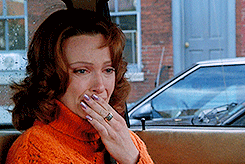
It was exciting. I grew up watching the Oscars. I love movies. I do it because I love it. And because I love it so much I was very intimidated. On the actual night I was petrified but I had my parents there and we had so much fun. It's a wonderful memory. Keanu Reeves shuffled by me and said 'evening ma'am' -- I remember that very clearly. 'You called me ma'am. What?!'
Also I remember I didn't realize what was happening but when they call your name, they do a shot of you. The producer of The Sixth Sense was behind me and tapped me and so I looked around and all you saw was the back of my head. People were telling me this after 'You should have done this. You should have done that.' But it was fun!
Sounds like you have a healthy attitude about all this.
Look, it's all swings and roundabouts. I'm going to work come what may because I love it. Having said that I'm really excited that Hereditary is getting attention. I can't believe it's Ari's first film. He's so incredibly talented. Even this first one out of the gate, I'm just so impressed with him as a filmmaker.
For someone who doesn't like horror, you already have two classics on your resumes in that genre, Hereditary and The Sixth Sense.
Yes. But they're both also almost classic dramas.
And they're both about grief, an interesting through-line.
My friends take the piss out of me 'You're the good 'grief' girl' [Laughs]. But I think grief unifies everyone. It puts life in perspective. I think filmmaking is a real opportunity to make people realize they're actually alive and they should live. It's so weird that we forget. We take so much for granted. These films that address that things are finite are kind of healthy in a way.

a previous excerpt from this interview
more interviews
more Toni Collette
more on Hereditary